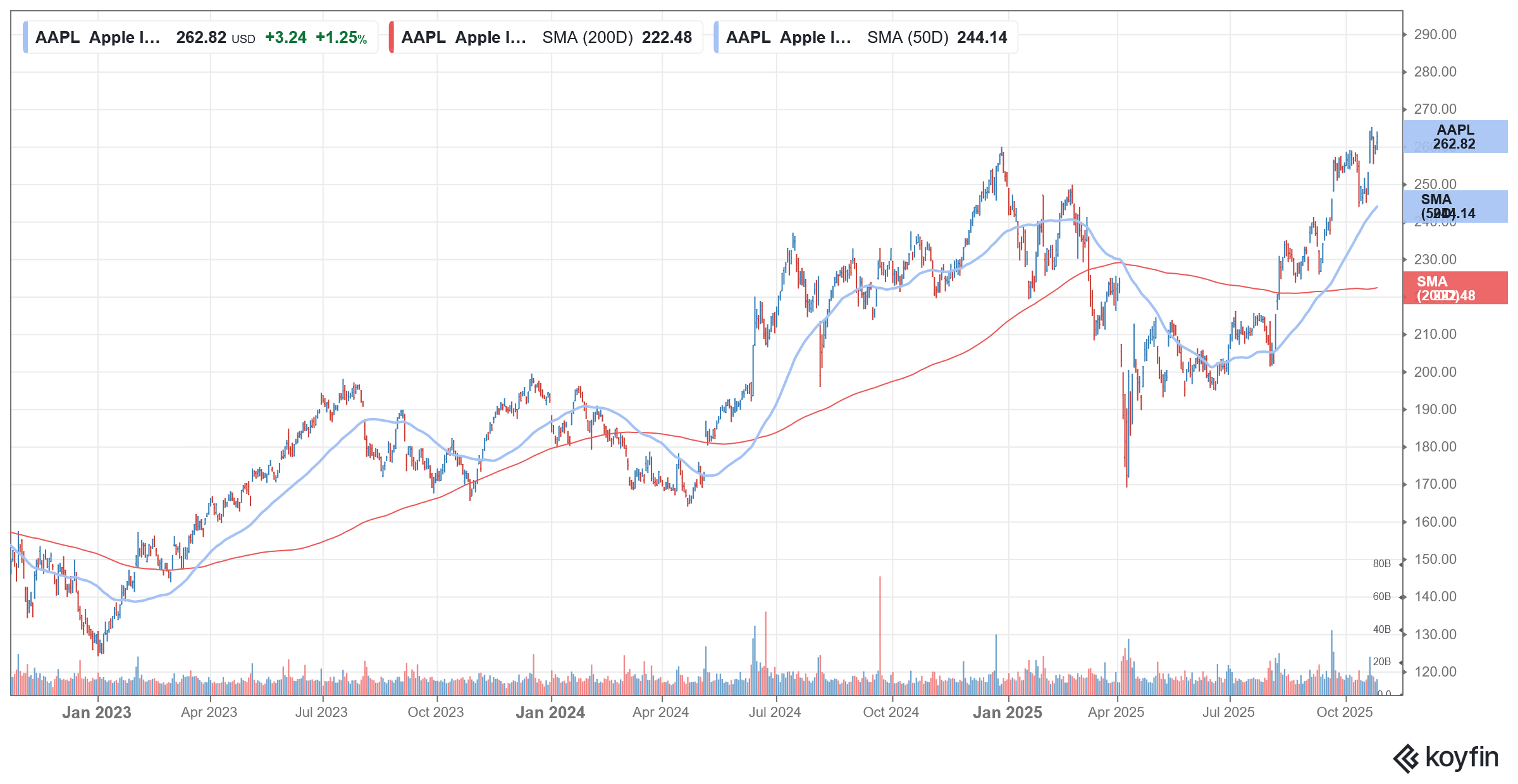Please note that we are not authorised to provide any investment advice. The content on this page is for information purposes only.
US tech giant Apple (NYSE: AAPL) has been dealt a significant legal blow in the United Kingdom, as a London tribunal ruled that the company abused its dominant market position by imposing “excessive and unfair” commissions on app developers through its App Store. The landmark ruling could potentially expose Apple to damages of up to £1.5 billion (approximately $2 billion), payable to millions of UK consumers.
Apple Loses App Store Case in the UK
The UK’s Competition Appeal Tribunal (CAT) delivered its ruling after a trial of the collective action lawsuit, which was brought on behalf of millions of iPhone and iPad users in the UK.
- Abuse of Dominance: The tribunal found that Apple had abused its dominant position in the market for the distribution of iOS apps and in-app payment processing.
- Excessive and Unfair Prices: It concluded that Apple achieved this by shutting out competition and charging excessive commissions—typically 30%—to developers, which were then partially passed on to consumers as higher prices. The CAT suggested that fair commission rates would have been significantly lower.
The case was led by Dr. Rachael Kent, a British academic, who argued that Apple had made “exorbitant profits” at the expense of developers and consumers by maintaining a “100% monopoly position” over app distribution on its devices.
Kent welcomed the decision and termed it “a landmark victory, not only for App Store users, but for anyone who has ever felt powerless against a global tech giant”. She added, “Today’s ruling sends a clear message: no company, however wealthy or powerful, is above the law.”
Apple Plans to Appeal the Ruling
Apple, meanwhile, plans to appeal the ruling, which it says “takes a flawed view of the thriving and competitive app economy”. An Apple spokesperson added, “This ruling overlooks how the App Store helps developers succeed and gives consumers a safe, trusted place to discover apps and securely make payments.”
Epic Games Sued Apple Over App Store Policies
Apple has faced similar issues in the US, also, where Fortnite publisher Epic Games had been involved in a long legal battle over App Store policies. For context, in August 2020, Apple booted Fortnite from the App Store after Epic Games allowed Fortnite’s in-game currency to be used directly instead of routing it through the App Store. Epic Games sued Apple for monopoly, and in 2021, US Federal Judge Yvonne Gonzalez Rogers ruled that Apple should allow developers to use cheaper payment options.
However, in 2024, Epic Games accused Apple of not complying with the order and charging developers new fees instead. In a recent order, Judge Rogers lashed out at Apple in her 80-page ruling.
“Apple, despite knowing its obligations thereunder, thwarted the Injunction’s goals, and continued its anticompetitive conduct solely to maintain its revenue stream. Remarkably, Apple believed that this Court would not see through its obvious cover-up (the 2024 evidentiary hearing),” she said in her judgment.
She warned the iPhone maker that “Apple’s continued attempts to interfere with competition will not be tolerated.” Rogers added, “This is an injunction, not a negotiation. There are no do-overs once a party willfully disregards a court order.”
Services Are a Key Driver for Apple
Apple disagreed with the court order and has appealed the decision. While Apple does not break down the revenues that it receives through the App Store fees, they are part of its hugely profitable Services business, whose gross margins are about twice that of the product business. The segment reported record revenues of $27.4 billion in the March quarter, which were up 13% YoY, with the growth rate expanding slightly compared to the March Quarter
Apple has warned of a hit of “hundreds of millions to billions” due to the proposed rules in the US. Notably, Apple had to allow third-party app stores in the European Union under the region’s Digital Markets Act.

AAPL Stock Has Risen to Record Highs
Meanwhile, after a tepid start to the year, Apple has now risen to record highs and is closing in on $4 trillion market cap amid reports of strong early sales for its new iPhone 17 series in its two most critical markets, namely the United States and Greater China. Recent data indicates the iPhone 17 lineup has significantly outpaced its predecessor, the iPhone 16, in initial sales, driven by distinct yet effective product and pricing strategies tailored for each region.
Notably, iPhone 17 sales are strong in China despite Apple’s ambitious suite of generative AI features, collectively known as Apple Intelligence, remaining unavailable in China. This absence is not due to a technical limitation or a lack of user demand, but rather a complex entanglement of strict Chinese government regulations and the geopolitical sensitivities surrounding artificial intelligence (AI) technology.
The primary reason for the delay is China’s comprehensive regulatory framework for generative AI services. Unlike many Western markets, China requires all AI models that generate text or images for public consumption to be tested and approved by the Cyberspace Administration of China (CAC) before launch.
AAPL Will Release Its Fiscal Q4 Earnings This Week
Meanwhile, Apple’s fiscal Q4 2025 earnings are scheduled for Thursday, October 30, 2025. Most analysts are bullish, forecasting a quarter where strong iPhone sales and reliable Services revenue are expected to drive results that meet or potentially exceed consensus expectations.
Analysts project Apple’s revenue will be $101.19 billion, an expected year-over-year growth of about 6.6%. The Q4 2025 EPS estimate stands around $1.74. This would represent a year-over-year increase of approximately 6.1% compared to the $1.64 reported in the same quarter last year.
The post Apple Faces Landmark Defeat in UK App Store Commission Lawsuit appeared first on Veritas News.
